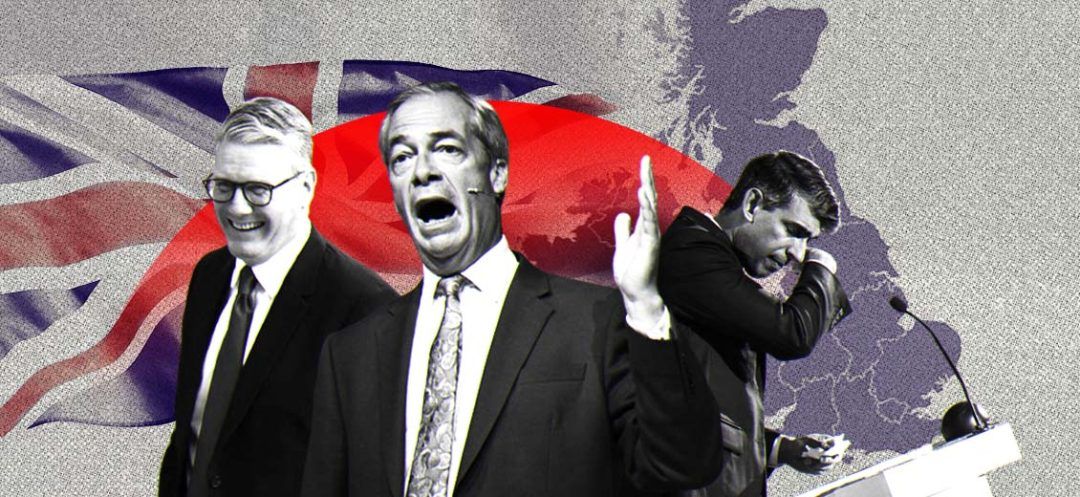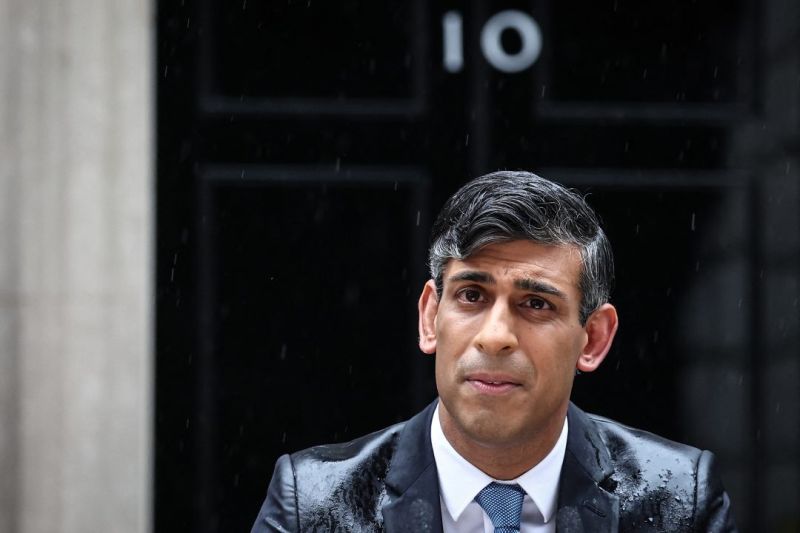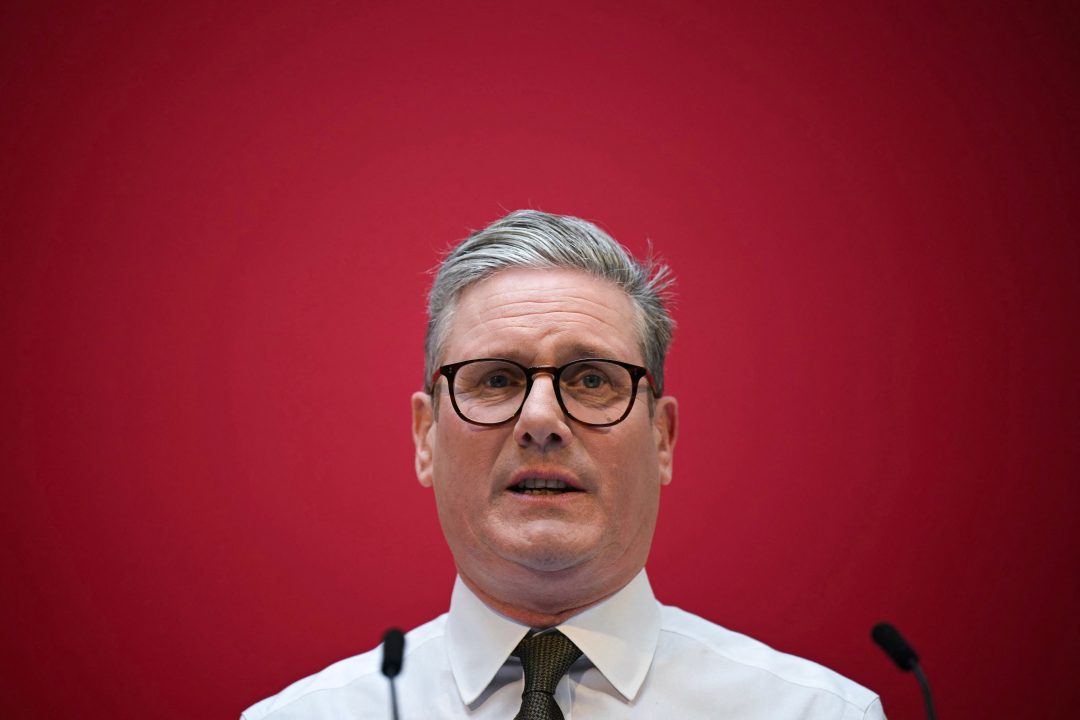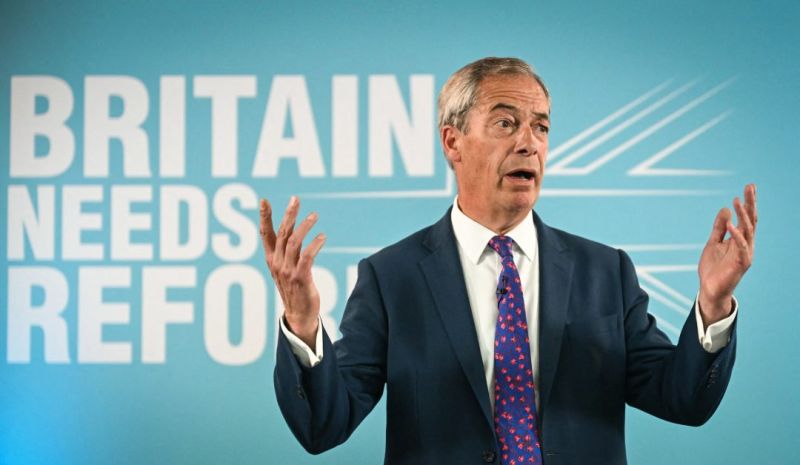- Home
- Middle East
- UK Election: Why You Shouldn’t Care, or Should You?

The UK’s “most boring election in history” is currently underway, with Labour’s Keir Starmer appearing, more than ever, the PM-to-be.
The battle for No.10 Downing Street is characterized by bland ideas and even blander politicians. But the real contest that will define Britain's future is on the right. As the traditional right crumbles, Britain's Brexiteer-in-Chief Nigel Farage and his Reform Party have reemerged, with a menu of parochial populist ideas that threaten to “devour” the long-standing Conservative Party.
On May 22, in an inauspicious start to a gaffe-filled campaign, the UK’s Prime Minister, Rishi Sunak, stepped out onto the rain-soaked steps of No. 10 Downing Street, to announce a snap election on July 4.
The umbrella-less Prime Minister, who seemingly forgot to plan for the vagaries of British weather, warned of voting for an opposition party with “no plan.”
However, his warnings are falling on deaf ears, as he heads towards electoral defeat.
So, began what has been called “the most boring election in history.”
 Britain's Prime Minister Rishi Sunak soaked in rain pauses as he delivers a speech to announce July 4 as the date of the UK's next general election at 10 Downing Street in central London on May 22 2024.
Britain's Prime Minister Rishi Sunak soaked in rain pauses as he delivers a speech to announce July 4 as the date of the UK's next general election at 10 Downing Street in central London on May 22 2024.HENRY NICHOLLS / AFP
The Most Boring Election in History
On the day of Sunak’s announcement, Labour were 21 points ahead in the polls. With a few days left to go, Labour remains 21 points ahead.
Polling is predicting a Conservative defeat of historical proportions, leaving little possibility for Sunak to retain No.10.
The election is a foregone conclusion, it will be a no contest Labour triumph. The Conservatives appear to have recognized this, focusing their campaigning in previously unassailable Tory safe-seats, in the hope of shoring up their remaining heartlands.
Tim Bale, Professor of Politics at Queen Mary University London, told This is Beirut that the fundamental problem for the Conservatives is that after 14 years in power, “the economy is flat lining, the cost of living has risen, public services are in crisis, and they've failed to demonstrate that Brexit has produced any benefits.”
Sunak seeks to frame himself as a candidate of good governance. Yet, the claim rings hollow in the shadow of his predecessor's failures.
Liz Truss failed to outlast a lettuce following her self-made economic implosion.
Boris Johnson’s compounding scandals and prolific partying during COVID-19 saw him booted from No.10 by his own party.
Theresa May found herself paralyzed by Brexit, which itself caused the resignation of her predecessor, David Cameron.
Fundamentally, the country is fed up with the Tories, and no far-fetched policy or slick campaign advert will change that.
 Britain's main opposition Labour Party leader Keir Starmer delivers a speech on stage during the launching of Labour Party election manifesto in Manchester on June 13 2024.
Britain's main opposition Labour Party leader Keir Starmer delivers a speech on stage during the launching of Labour Party election manifesto in Manchester on June 13 2024.Oli SCARFF / AFP
Yet, this coming electoral landslide is peculiar for its lack of an exciting challenger. Agnès Alexandre-Collier, a researcher at the Maison Française d’Oxford, told This is Beirut that “there is no enthusiasm for the Labour party, but there is a hope that now an ‘adult’ will be in power.”
Labour leader, Keir Starmer, an Oxford graduate with an illustrious legal career, has worked to move the party away from the left-wing populism of his predecessor, Jeremy Corbyn, instead advocating for a more technocratic centrism.
His manner of speech could at best be described as flat, and his pre-prepared quips about his love of football and his father being a tool-maker often elicit cringing groans.
According to Alexandre-Collier, “Starmer is perceived as boring and dull … as disconnected from the working class, and as part of the liberal cosmopolitan elite.”
She added that Starmer's position on key issues is often inconsistent, as he tries to manage the party’s diverse viewpoints.
With the result a foregone conclusion, and neither candidate inspiring excitement, public engagement has been lukewarm. Two million fewer people watched the leaders debate than in 2019, and pollsters are warning about the lowest election turnout in history.
The Real Contest Is to the Right
Yet, this election will be pivotal, not for deciding the next government, but for determining the future of the conservative movement in Britain.
 Leader of Reform UK Nigel Farage delivers a speech to launch the hard-right party's general election manifesto in Merthyr Tydfil south Wales on June 17 2024.
Leader of Reform UK Nigel Farage delivers a speech to launch the hard-right party's general election manifesto in Merthyr Tydfil south Wales on June 17 2024.JUSTIN TALLIS / AFP
On June 3, Nigel Farage, the populist figurehead behind the 2016 Brexit referendum, announced his candidacy, stating, “no one believes a word [the politicians] say, no one is listening, we are zoned out… Britain is broken, Britain needs reform.”
Subsequently, support for his Reform UK party has surged. With some polls now putting Reform ahead of the Conservatives, Farage has begun styling himself as “the real leader of the opposition.”
He is open in his intention to “establish a bridgehead” to parliament in this election, with his eyes on No. 10 in 2029.
According to Bale, “Farage is the consummate populist politician, claiming to represent ‘the people’ against a supposedly corrupt elite” who, in opposition, “will do what they always do – whine from the sidelines and propose simplistic solutions with no basis in reality.”
The Future of the Conservative Party
There is an increasing chance that July 4 may be an electoral bloodbath of existential proportions for the Conservative party.
The Conservatives will face a choice post-election, either to “double down in their attempt to be a diluted version of Reform or return to the center ground of British politics,” says Bale.
According to Alexandre-Collier, this decision may hinge upon the scale of their defeat. She envisioned two possible scenarios.
Some polls are predicting a loss that may leave the Conservatives with less than a hundred seats. Such an unprecedented defeat would see many of the party’s leading centrists unseated, empowering the party's right and even facilitating “the possibility of a partnership with Reform.”
Suella Braverman, former Home Secretary and leading figure on the party’s right, said that she would “welcome” Farage into the party.
However, Alexandre-Collier added, “If the Conservatives do okay in the election, these centrist candidates would be opposed to any partnership with Reform.” They would instead push for a shift back to the center to retake it from Labour.
It is clear that in a party riven by such acrimonious factionalism, a contest to define its future is inevitable. Whichever direction the party chooses may trigger defections from disaffected MPs on the opposing wing, further diminishing the party's presence in parliament.
Britain's New Conservatism
Questions remain as to the viability of Reform’s radical solutions to stop Britain's decline.
On June 17, Reform published what it termed its “contract with the people.”
Characteristically light on details, it instead proposes vague policies such as “banning transgender ideology,” “ending woke policing” and “targeting Turkish barber shops.” However, such simplistic rhetoric will likely appeal to parts of the electorate who feel fed up with the overly technocratic jargon of the political mainstream.
Central to Reform’s “contract” is a commitment to totally stop illegal migrants crossing the English Channel. They hope to achieve that by forcibly returning migrant boats to France.
When asked in a recent press conference about what Reform would do if France refused returnees, Farage said, “We would have to use the royal marines.”
He went on to add that whilst he “didn’t intend to declare war ... the French need to know we’re serious.”
France itself is on the precipice of a far-right government, riding a populist wave that is sweeping across the continent. Many in Britain will have hoped that following the chaotic convulsions of the Brexit years, Britain had exorcized its demagogic demons.
Yet, the results of the “most boring election in history” may set the stage for a decade of turmoil as Europe’s populist wave hits British shores.
Read more




Comments